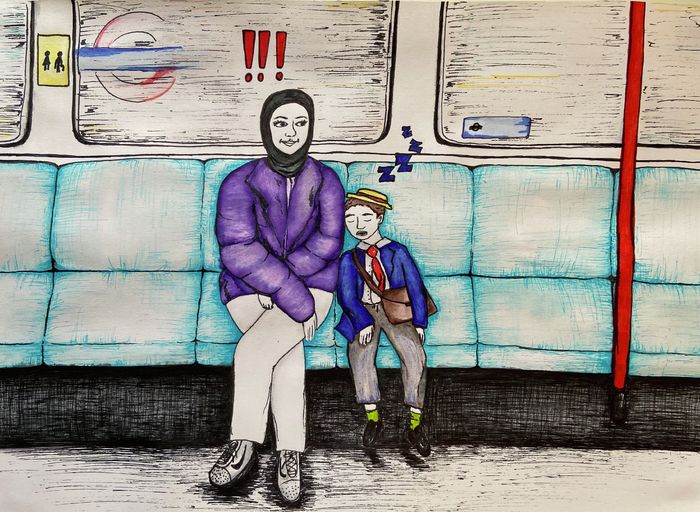A halftime huddle
Halfway through his time at Cambridge, Sobaan Mohammed takes stock of his experience as a disadvantaged student, making the case that access doesn’t stop when you matriculate

My first term was a bit of a rollercoaster. From completely losing my appetite the week I moved in, to falling during the matriculation photograph, my first Michaelmas was interesting, to say the least. In that first week, I was hopelessly certain that I wouldn’t be able to survive the term, and the idea of intermitting played on my mind. Fortunately, with the help of my tutor, DOS, and college nurse, as well as the wonderfully supportive people I’ve gotten to know here, I was able to make it through the term.
When I reflect on my time here so far, a lot of thoughts come to my mind. For example, how Cambridge is significantly different to my area of Birmingham; how the idea of the ‘university experience’ does not apply to those who bring a lot of emotional, invisible baggage with them; or how I’ve met very few people here who come from a similar background to me.
“The way people walked, dressed, talked, the nonchalance, confidence and entitlement with which they went about their lives, truly made me feel like an outsider”
That last point was, and still is, especially profound for me. After moving in, I felt really out of place, precisely because I could barely find people like me. I come from a single-parent family in a deprived, inner-city area of Birmingham and have received free school meals my entire schooling life. Last term, I was extremely cognizant of how my life experiences differed significantly from others. For me, this awareness was almost palpable, as though written on the faces of everyone around me. The way people walked, dressed, talked, the nonchalance, confidence and entitlement with which they went about their lives, truly made me feel like an outsider in comparison.
This takes me back to a time in Year 10 or 11, when I was speaking to my counsellor and told her how certain I was that out of all the 700 or so students in my school, I was probably the only person with my background, comparing my life to an Indian drama with its countless series of plot twists. She smiled and said she could think of one other person like me. Now, if that was the case in my school in Birmingham–granted, it was a grammar school–then in a place like Cambridge, it would be even more so the case. My point is, the feeling of uniqueness and alienation that I felt then in secondary school is still present with me – in fact, it’s even stronger.
I also remember being asked what my parents worked as when I was younger and how I’d be embarrassed to tell the truth: at home was just my mum, who worked, and still works, as a dinner lady. I’m no longer ashamed of this fact, but still, I can’t help but feel a touch of insecurity when people talk about the jobs their parents have or the holidays they went on during the summer or Christmas break, which I instead spent co-managing the household.
“As a disadvantaged student at Cambridge, you are not on an equal playing field”
The truth is, this is the reality of a place like Cambridge. In one of his videos, Ibz Mo–whose videos I used to watch religiously–said that as a disadvantaged student at Cambridge, you are not on an equal playing field. I’ve now realised, recognised and experienced that fact. Now, in a bid to maintain my authenticity, I feel a pressing urge to assert and root myself to my “access” background. I tell myself that I haven’t come here to pretend to be someone else or live a different life, but this endeavour is difficult when I feel like my experiences are isolated. Some may say that these are self-imposed barriers between myself and others and that I fail to acknowledge that people from all backgrounds exist here. But is it unreasonable to want to find similar people here? Surely, if Cambridge has made great strides in widening participation and access, this shouldn’t be a problem?
This is where, I now realise, the fundamental problem lies: the way we approach access as a concept first and foremost. Access should not simply be about getting people into Cambridge, merely meeting a benchmark or target, and leaving them fending for themselves. It should be about creating a space, a social network, where students from similar backgrounds can support one another and feel as though they belong. If there’s one thing I have now learnt about creating spaces in university, it’s this: where a space exists, participate and engage in it; where a space exists but is inactive or inadequate, revive it and be persistent in shaping it; and where a space doesn’t exist, create it. Perhaps that is what now needs to be done.
 News / Eight Cambridge researchers awarded €17m in ERC research grants27 December 2025
News / Eight Cambridge researchers awarded €17m in ERC research grants27 December 2025 News / Downing investigates ‘mysterious’ underground burial vault 29 December 2025
News / Downing investigates ‘mysterious’ underground burial vault 29 December 2025 Lifestyle / Ask Auntie Alice29 December 2025
Lifestyle / Ask Auntie Alice29 December 2025 Sport / Hard work, heartbreak and hope: international gymnast Maddie Marshall’s journey 29 December 2025
Sport / Hard work, heartbreak and hope: international gymnast Maddie Marshall’s journey 29 December 2025 Interviews / Meet Juan Michel, Cambridge’s multilingual musician29 December 2025
Interviews / Meet Juan Michel, Cambridge’s multilingual musician29 December 2025










